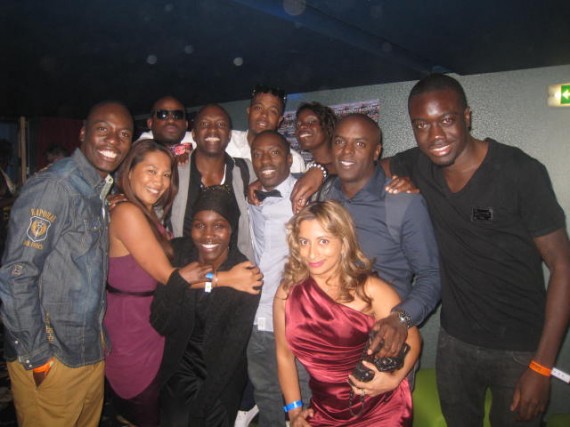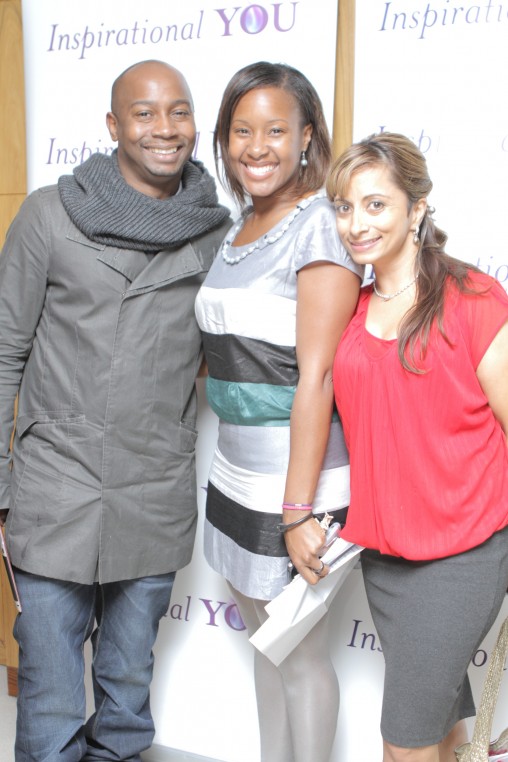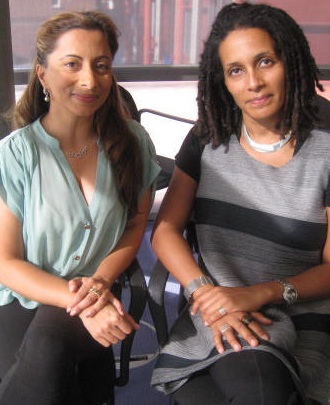 MOBO AFTER PARTY VIP- group banter with EDDIE KADI, WALE AEYEMI, ADIDAS PR MAVEN POALA LUCKTUNG, TREVOR NELSON and friends.
MOBO AFTER PARTY VIP- group banter with EDDIE KADI, WALE AEYEMI, ADIDAS PR MAVEN POALA LUCKTUNG, TREVOR NELSON and friends.
Our scenes been on and off planes, trains and automobiles this week toing and froing from Glasgow for the annual Mobo Awards -more on that next week!.
The night after MOBO I had to take a 4am train back to London to make it to the journalist full day ‘’NEWS REWIRED’’ day where many reporters speak and engage their experiences together. I attended specifically to hear and meet one of my favourite reporters Paul Lewis, who is special projects editor at the Guardian. During the London riots his were the most up to date, reliable, trustworthy, balanced stories.
 JASMINE WITH INSPIRATIONAL YOU founder SONIA MEGGIE and branding consultant DAREN DIXON.
JASMINE WITH INSPIRATIONAL YOU founder SONIA MEGGIE and branding consultant DAREN DIXON.
Before all that though I was asked to chair the regular INSPIRATIONAL YOU seminar at the very opulent Pearson building in Charing Cross that focused on ‘succeeding in the entertainment and media industry”. Organizers told me ‘’you are Ms Entertainment and know the business inside out, as well as doing a fantastic job on London 360. we therefore wondered if you would consider being our host on the night and bringing your team down, we have been trying to identify a host who understands the industry and can also give insight at the same time’’. Readers-how could I refuse? Especially when they told me the panelists were DJ Steve Sutherland, ITN HEAD NEWS EDITOR Robin Elias, BBC BREAKFAST TV Producer Anthea Lee, former Head of CHOICEFM and BANGFM radio Ivor Ettiene and tinie tempah’s manager dumi Oburota. I arrived to find a delicious spread of Caribbean and Indian canapés and drinks on offer to settle our rumbling post-work stomachs. The panel introduced themselves and the advice, experience and anecdotes came thick and fast. Many young people don’t know about how to get into or attract an employer to their cv so we shared tips on this as well as take questions from the floor. one thing that became very apparent to me was that many newcomers to TV don’t understand the structure of jobs within the TV structure. So I promised to run up a chart and so it was up on my personal blog the very next day. Next? Steve shared tips on how artists should and shouldn’t approach DJ’S. Robin talked about how he saw the news room platforms changing and his top 5 things he looks for in future staff. Anthea talked about elements she looked for in a music act to see if they fit the ‘’bbc sofa commercial household name’’ remit. Ivor talked about networks and career moves within the radio industry and Dumi told his fascinating story about learning all he knows about music management by reading books, observing the scene and asking loads of questions as well as the branding of the superstar they call tinie tempeh. Want to know the answers to all this? you might want to become a part of INSPIRATIONAL YOU.
 JASMINE WITH CHANNEL 4’S ARTS COMMISSIONER-TABITHA JACKSON.
JASMINE WITH CHANNEL 4’S ARTS COMMISSIONER-TABITHA JACKSON.
I ended my week catching up with Channel 4’s Tabitha Jackson, a lady I’ve admired from afar for a while now. I became aware of her after noticing the Channel 4 street Summer Season which recently featured CONCRETE CIRCUS, LIFE OF RHYME, GRAFFITI WARS, HOW HIP-HOP CHANGED THE WORLD, ONE MAN WALKING and STREETDANCE. When I watched all these shows I was blown away. Both excited and gutted. Excited cos finally a mainstream broadcaster had covered the vast uk urban scene in a respectful and qualitative manner. Clearly big budgets, an attention to artistic detail and getting the right talent involved was considered with akala, jonzi d, cookie crew, noel Clarke and many many more from the old skool and new skool urban worlds combining to make a great documentary series of shows. I was gutted cos clearly this is the stuff I’d been dying to make myself during my years at MTV and other broadcasters and felt it should have had air time many years ago. I know how tough it is to convince senior TV management teams to make content like this and how hard it is to get it right. So I joined Tabitha Jackson for a conversation to see just how she’s made all this happen. id expected a London born and bred hiphop cultured lover. I couldn’t have been more wrong. Tabitha is a beautifully mannered, friendly, softy but authoritivly-spoken lady who knows what’s current and has her finger on the pulse. But as she told me…..she was ‘’born in Coventry and I was brought up in a tiny rural village in Warwickshire called Napton on the Hill. With a windmill and lots of canals, a really really rural upbringing. I was adopted, my dad was the local vicar so I think when people look at me they don’t expect that was my upbringing’’. Tabitha explained that her speciality might not have been hip-hop but it was TV just cos she ended up watching so much ‘’living in small village without a driving licence meant that I watched a enormous amount of television and I remember actually watching the first night of channel 4 absolutely glued to it -it was amazing. I think that’s why I have feel that connection with channel 4 because I was 12 and as I was being shaped then channel 4 was part of that’’. I understood exactly how Tabitha feels. I recall channel 4’s launch too as I attended the opening night party and grew up thinking they were my generations broadcaster that were connected to me. and of course my first few years in TV were at channel 4. unlike me though who has a degree in related media subjects, Tabitha did a philosophy degree and when she finished that she worked for some composers in Soho for a couple of years. ‘’They were doing music for films which was interesting. But my big break was going to the BBC where I worked in publishing in my university holidays and the BBC were doing a massive oral history series -26 episodes called ‘people century’. And I went there to work on the book. Then I soon thought wait a second I liked the bits with pictures more. So I ended up slipping in across into the production team and worked on that for a couple of years. That was absolutely my biggest ever break because it was a huge team it was protected it was intelligent public service television and we had a reunion just last weekend’’.
So Tabitha clearly understands how to manoeuvre in this manic media world and make the jump from platform to platform but I was most impressed with the length of time she’s taken to perfect her craft. She revealed ‘’I slid in as a researcher and than an AP and then producer and then a director. But it took long time but that was good thing actually, you would effectively be serving an apprenticeship with people who would be very experienced and this wealth of knowledge that they could share with you and you were on a realistic contract so you felt safe’’.
Unlike today where reporters are expected to research, script, shoot, edit and promote their content, Tabitha explains she’s not a shooter ‘’I did do some shooting have but its not very pretty. Now it’s a skill that I wish I had but in a way I look back on fondness on those times where you just have to concentrate on one thing and in doing it well rather than everything else at once’’.
Tabitha also wrote a book and lived in New York for a bit, and whilst she was out there was approached by channel 4 to see if she would like to join the commissioning team. ..’’Coming into channel 4 after being at the BBC for good few years. Firstly it was fantastic because it was small it was an institution -You know the first thing I noticed when I came up was how many people that were non-white faces were coming out of the door and I don’t usually seethe world in the terms of colour. So it was a real first impression, but my biggest shock was the culture shock being commissioner editor rather than a producer or director’’.
Obviously Tabitha having gone from programme maker to commissioner means she’s not so hands on anymore ‘’well the thing I miss most is that complete immersion into a subject matter that you get when you are making a film or going places that I will never normally go to. So that’s being a filmmaker but the commissioner editor side of it I love the fact that you could go into so many peoples edits and you can talk about ideas and you can see how’s it all done and you can be there when the magic happens when its put together. If you do it right you can be a real enabling force. The downside to commissioning is having to say no really when ideas are perfectly good but is just not right for us and you know people have spent thousands of pounds hours of pounds in developing stuff, the best moment is saying yes and worst moment is saying no’’.
Tabitha broke down her current job remit for us ‘’I am the commissioner editor for arts at channel 4 and the remit is really anything that is art. I am taking it in its broadest sense because I think coming in I felt that art television not arts but arts television was very narrow in what it focussed in and quiet dull and scholastic almost that we going to be lectured and sometimes its absolutely fascinating ways but it was in lecture mode of you need to learn about this make you into a more civilised person so I am going to tell about it. They are expressing it creatively so I think, in my egomaniacal of way I want people in 50 or 100 years to look back at the channel 4 arts output and somehow understand of who we are now. Whereas if you do that for most of the arts output from all the broadcasters then we would think; we are a people obsessed with impressionist painting or obsessed this school and you don’t have a sense of all the amazing creative expressions what’s going on now and what people preoccupation are.
being aware of your competitors content is important and when i asked her about the BBC’s current ”mixed race season” this is what she had to say ”As a mixed race person I’m delighted that there’s a mix race season. I also think that actually when I heard about the mixed race season and I heard about the white season I was really jealous. Working at channel 4 that’s our territory we should be doing that. I do have slightly mixed feelings about the mixed race season just in the sense of mixed race I have mixed feelings about using the word race as a kind of.. as a reality. …but I don’t describe myself as mixed race really. What’s a race? What races I’m I mixing in? What’s a race in the first place? So yes certainly I got mixed ancestry but everybody does, I’ve got dual heritage but lots people do. So it will be great. I am not sure what’s in the BBC season but if they go into and have a discussion about what mixed race actually means… and also I hope it reflects not just African Caribbean white mixed race or African white that it can be, you know, Jewish and Turkish mixed race”.
Tabitha explained how STREET SUMMER came about ‘’it happened when just before I started the job and I went for a drink with Roy Ackerman who’s been in the business for years. So his advice was never give up the mainstream yes you’re doing arts but don’t think that means you have to be on the side-line’s and then we were talking about Hip-hop. Those two things came together and I just I thought I know I want the arts to be about what’s around us in what people are doing. You can’t look out the window and walk down the street without some manifestation of it. Street dancers on the television, Banksy making films . This stuff is not niche its mainstream and yet I thought in my egocentric way I don’t understand it and I want to, I don’t understand the discipline and the rigour of it and I want to in the same way that I have been taught I should understand the rigour and the discipline of ballet. So it was born out of curiosity’’.
Having seen the content of all the urban shows i assumed Tabitha was a big urban culture specialist. instead she revealed ”Massive learning curve. There were meetings; almost every meeting for the first couple of months, people would just talk. There just be words that I had no idea what they were and they would turn out to be incredibly famous rap artist or, you know, hip hop artists or dancers and just hadn’t heard of them. So it was a huge learning curve”.
This summer Tabitha made all young people feel connected and engaged with our media by screening STREET SUMMER. we need more Tabitha’s in our world!

 Follow
Follow